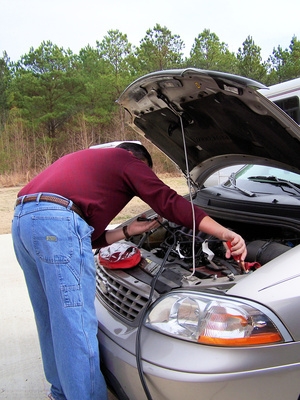
There are two things to look for when a Ford Excursion will not start. If the engine does not crank, you should check the electrical system. If the engine cranks but does not start, check the fuel delivery system.
Check the connections to the battery. The battery terminals and connectors should be free of corrosion, oil, dirt and debris. If necessary, clean the terminals and connectors, then measure the voltage at the battery terminals using a voltmeter. The voltage should be about 12 volts. If it is less than 12 volts, place the battery on a battery charger.
Turn the ignition to "START" while measuring the voltage at the starter solenoid. The voltage should be approximately 12.8 volts. If you get that reading, then the problem is with the starter because it won't turn the engine over even though the voltage is correct. Remove the starter and retest. If the voltage is less than 12 volts, there might be a problem with the starter relay.
Follow the wires from the starter solenoid to the starter relay. Turn the key switch to "START" while measuring the voltage across terminals 85 and 86. Terminals 85 and 86 can be found on the underside of the relay. They are the voltage wires used to turn the relay on.
The measured voltage should be approximately 12 volts. If the voltage is less than 11 volts, there is a problem in the key switch circuit because the starter relay is not getting the proper voltage to turn on. If the voltage is 12 volts, replace the starter relay because it is not turning the starter on even though it has the proper voltage.
Remove and inspect the fuel filter. If it is dirty or clogged it will limit the amount of fuel delivered to the cylinder. A dirty filter should be replaced.
Inspect the wire harness to the Engine Control Unit, injectors, glow plugs and engine timing sensors. The connectors should be secure and the harness should be free of abrasion and corrosion. If not, have the connectors repaired and have a professional mechanic monitor the engine, timing and starting features.